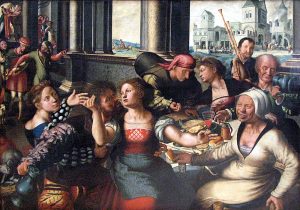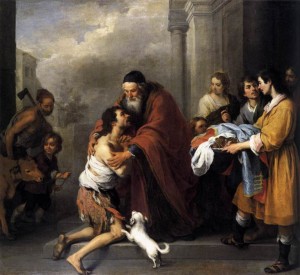Parable of the Prodigal Son (1536) painting on oak wood by Jan Sanders van Hemessen (c.1500-c.1566). Royal Museums of Fine Arts of Belgium, Brussels. (Click image to enlarge.)Thoughts on Sunday’s Lessons for March 27, 2022 (Lent 4C)
First Reading: Joshua 5:9-12
Repentance – literally, turning back from a wrong path and changing to a right one – forms a consistent theme through Sunday’s readings.

Parable of the Prodigal Son (1536) painting on oak wood by Jan Sanders van Hemessen (c.1500-c.1566). Royal Museums of Fine Arts of Belgium, Brussels. (Click image to enlarge.)
From the people’s arrival at the Promised Land to the prodigal son’s joyous return home, we hear that God is with us through transition and change. In our first reading, the Israelites have come to Canaan, the land of milk and honey, after 40 years wandering in the desert. They celebrate with bread made from the produce of the promised land. Later in Joshua we will discover that people already live on the land. It will have to be taken by bloody force, a darker side of Scripture’s ancestral legends. In this passage, though, we simply share in the joy of completing a long journey.
Psalm: Psalm 32
Hear the message of Psalm 32: We don’t always do the right thing. In our hearts we know this, even as we feel the pain of knowing that we have wronged another, or hurt a loved one. When we step away from God, who loves us and who always stands ready to forgive, our guilt piles up and we groan in sorrow. When we repent – when we stop being stubborn and turn back from our wrongful ways to trust in God – we feel the comfort and joy of knowing God’s forgiveness.
Second Reading: 2 Corinthians 5:16-21
Paul was dealing with an angry, troubled congregation as he wrote his second known letter to the people of Corinth. They are mad at him, and he’s not happy with them, either. But he loves them still and seeks their forgiveness. God gave us Christ to reconcile the world to God, Paul writes. Our new direction as Christians, he tells them, comes when we recognize Jesus not only as human but as the Christ, the Son of God, the Messiah. In Christ everything old has passed away, he says. Everything has become new!
Gospel: Luke 15:1-3, 11b-32
It seems easy to grasp the meaning of the parable of the Prodigal Son: God forgives us when we stray and then return. Even if we have been prodigally sinful, God welcomes us home with a father’s joy and abundant celebration. But wait! There’s more: Look at the rest of the story. At the end of this passage, the older brother, hurt because his consistent good behavior won him no such praise, hears of his father’s loyal, long-standing love. And at the beginning of this parable, we hear why Jesus told this story: It was a response to a group of grumbling Pharisees and scribes, showing them that a sinner’s return deserves as much celebration as the recovery of a lost sheep or a silver coin.



